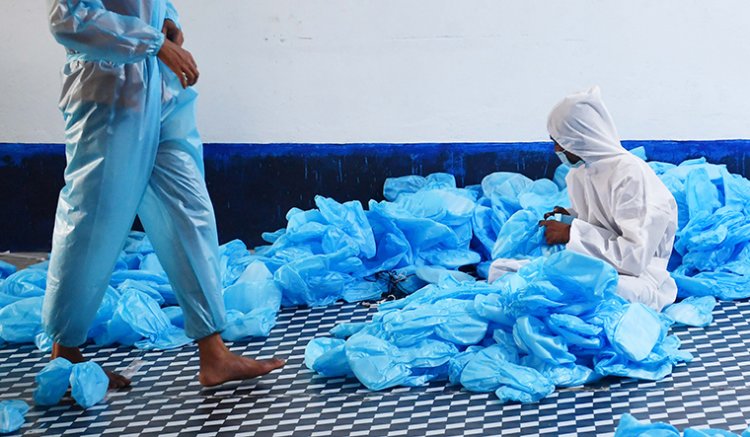The COVID 19 Aftermath: Potential PPE Pollution Outburst

As if there weren’t enough challenges that this pandemic was throwing at us, there’s another potential challenge that we may have to deal with in the near future. The Covid-19 crisis is leading to a new source of pollution as personal protective equipment (PPE), such as gloves and facemasks, makes its way into the world’s seas and oceans.
“They found a lot of it in Italy. They found a lot of PPE in beaches of Japan and Southeast Asia,” said senior scientist Jennifer Brandon, Ph.D. about personal protective equipment, or PPE. “We’re already finding thousands of gloves and masks as the pandemic continues.”
Brandon believes more people are using and also improperly disposing of these single-use plastics and says the litter can last several lifetimes.
“I would not be shocked if it’s going to be in the hundreds of thousands in gloves and masks in the next years,” she said.
Brandon says with grocery stores no longer allowing reusable bags and restaurants serving to-go orders in Styrofoam containers, this is adding to the problem.
This plastic pollution has a chain effect, impacting animals and humans.
“That plastic is going to get eaten by animals and those animals are what you eat,” Brandon said. “Sometimes it can break down small enough, it even gets into our water supply and sea salts.”
Experts say 30 billion pounds of disposable plastic is dumped into the ocean every year. Now, that number is expected to rise even more due to PPE waste.
“We expect that plastic pollution will outweigh fish in the ocean if we don’t take care quick action to prevent that from happening,” said Shelley Luce, president of Heal the Bay, a non-profit with the mission of keeping water clear and clean.
“We do beach clean ups year-round and we generally get 700 to 800 people coming out early on a Saturday morning,” she said.
With social distancing orders and many beaches closed due to COVID-19, large group gatherings are no longer allowed in some areas.
So, Luce is now encouraging people to clean up what she calls “COVID waste” on their own or within their social bubble.
“You can do a clean up in your neighbourhood,” she said. “Pick that trash up off the streets because you know where that's going to go, into a storm drain and out into the ocean.”
Luce says there are simple solutions for this worldwide problem: properly dispose of PPE or wear a cloth mask, both of which can help stop the spread of coronavirus without creating an environmental hazard.
Already, some 8 million tonnes of plastics enter our ocean every year, adding to the estimated 150 million tonnes already circulating in marine environments.
One study estimates that in the UK alone, if every person used a single-use face mask a day for a year, it would create an additional 66,000 tonnes of contaminated waste and 57,000 tonnes of plastic packaging.
World leaders and politicians are aware of the problem and that it needs to be addressed.
“Maritime nations know far better than anyone how our ocean economies are dependent on ocean health,” said Zac Goldsmith, Minister, Department for Environment, Food and Rural Affairs in the UK in a recent World Economic Forum webinar about ensuring a green recovery.
“But we all ultimately depend on our shared oceans and changing the role that plastic plays in every part of our economy.
“Efforts to tackle plastic pollution can help us improve ocean health, tackle climate change, support biodiversity and build sustainable livelihoods.”
Single-use plastic waste is not the only impact COVID-19 is having on the environment.
Despite a temporary crash in carbon emissions as lockdowns have meant fewer people travelling and less industrial activity, there are concerns the pandemic will divert governments’ attention away from green issues.
The UN’s COP26 climate change conference, set to be held in November 2020, has already been postponed.
In some US cities, recycling programmes have been paused, while parts of virus-hit Italy and Spain also put a hold on recycling.
The quarantine economy has driven more people online, resulting in greater packaging waste from deliveries and Medical waste has increased an incredible amount.
Import and export restrictions, as well as declines in the availability of cargo transportation, mean that large amounts of food have also gone to waste. And as this organic waste decays it will release greenhouse gases.
And unless economic stimuli focus on green initiatives, there is a risk of a sudden upsurge in polluting activity as construction and manufacturing are used to drive recovery from the global downturn the virus has created.
“Let this moment be a wake-up call for all of us,” Goldsmith says. “As countries emerge from the pandemic, we will all have to find ways to rebuild and to renew.
“And I think that gives us a one-off huge opportunity to choose a different path - one that ensures environmental sustainability and resilience are the lens through which we make decisions and map out our recovery.”
With an approaching tidal wave of waste from this equipment, scientists are concerned about the impact it could have on the environment.
Researchers behind a new study propose a solution: They argue that this influx of discarded PPE could actually be good for Earth if transformed into biofuel using a simple chemical process.
In the study, published in the journal Biofuels, a team of scientists from India describe a simple process that could transform the plastic material present in many PPE, polypropylene, into biofuel on par with traditional fossil fuels like diesel. This is the same kind of material used to make prescription bottles or yogurt cups.
The study's lead author and professor of chemistry, Sapna Jain, argues that sustainability cannot be overlooked, even when it comes to life-saving equipment like PPE.
"Presently, the world is focusing to combat COVID-19, however, we can foresee the issues of economic crisis and ecological imbalance also," she explains. "We have to prepare ourselves to meet the challenges which are forcefully imposed by the COVID-19 pandemic, so as to maintain sustainability."
How It Works:
Breaking down this type of plastic is a standard, three-step process that involves a lot of heat and breaking a few (chemical) eggs. It essentially comes down to:
- Initiation
- Propagation
- Termination
This process itself is called thermal pyrolysis. Initiation is when a plastic material is exposed to super-hot temperatures (between 572 and 752 degrees Fahrenheit) in order to produce free radicals. You might be familiar with free-radicals as the potential culprit of aging in our skin, but in a more general sense, they are just uncharged, single molecules who are very eager to find a partner (e.g. an extra electron). They are also willing to steal someone else's in the process.
After free radicals are released from the plastic, they are further broken down into smaller radicals and molecules during propagation reactions. Finally, these unstable free radicals are brought together in couples as part of the termination step.
The authors write that this process is not only standard but has the added benefit of not needing plastics to first be separated beforehand, meaning using mixed plastics (like PPE) would work just as well.
The Results:
After undergoing this chemical transformation for 60 minutes in an oxygen-free environment, the researchers report that this plastic turned into a biofuel with characteristics on-par with traditional fuels like diesel or gasohol. And with at least an 80 percent liquid yield, the process was able to productively use most of the plastic material.
Co-author and professor of chemistry, Bhawna Lamba, explains that this process could simultaneously address both problems of PPE waste management as well as those of clean energy.
"The challenges of PPE waste management and increasing energy demand could be addressed simultaneously by the production of liquid fuel from PPE kits," Lamba says. "The liquid fuel produced from plastics is clean and have fuel properties similar to fossil fuels."
The authors write that the biofuels created using this method could be used to fuel turbines, boilers, or generators. PPE conversion has the potential to not only "prevent the severe after-effects humankind and the environment," they argue, but to result in a new source of energy.
Personal protection equipment (PPE) has become an essential prerequisite for healthcare workers. PPE kits are reported to provide sufficient protection against pathogens but their disposal can be devastating to environment. The proper disposal of PPE needs to be taken care of by the national authorities according to the guidelines provided by WHO else the burden of plastics would be handled by none!















































